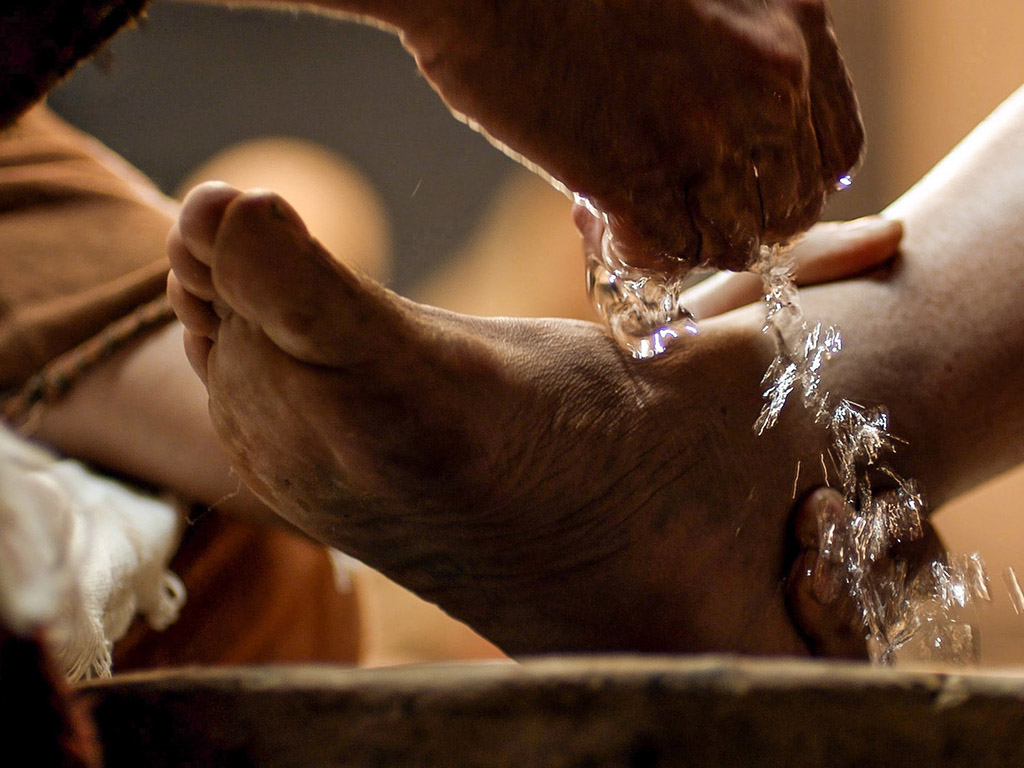
The Gospel of John is quite unique, as anyone who has even casually read the four Gospels knows. Not only does he record events and sayings of Christ that the others do not, but he also focuses heavily on specific periods of time in Jesus’ ministry. For instance, the final 10 chapters, or roughly half of the Gospel, cover the last 2 months of the life of Christ. And chapters 13-17 all take place in a space of less than four hours. And whereas Matthew, Mark, and Luke will recount a conversation between Jesus and a group of people in three or four verses, John takes an entire chapter, or more, to describe in vivid detail not only what is said, but how it was said, and why it was said, and what the motivations were behind it. This makes John’s writing very interesting, but even more than interesting, it makes it intimate. So, while considering the Gospels, it is helpful to think that the synoptics are portraying Christ in his public persona, and John is a portrait of his private, intimate character.
In chapter 13, where the Last Conversation begins, following the Last Supper, John really outdoes himself in this respect, staging the entire evening in incredibly vivid detail.
Now before the feast of the passover, when Jesus knew that his hour was come that he should depart out of this world unto the Father, having loved his own which were in the world, he loved them unto the end. And supper being ended, the devil having now put into the heart of Judas Iscariot, Simon’s son, to betray him; Jesus knowing that the Father had given all things into his hands, and that he was come from God, and went to God; he riseth from supper…
First, notice the dramatic irony that John makes use of. Dramatic irony is the literary device where the audience knows things that the protagonists do not. Here John chooses for us to experience this conversation in a way that they themselves did not. When the disciples experienced this conversation with Jesus, they had no idea of any of the staging that John sets up in this opening paragraph. For all they knew, this was just a quiet supper before the big week of the passover. But we know that it was far more than that. Even when events began to transpire that were obviously more than ordinary, they still did not realize just how extraordinary this evening would become. But John pulls the curtain back, right at the start, and thoroughly contextualizes everything that is about to transpire; which makes reading this very exciting.
Also notice how he builds the scene. The sentences are terse, with no conjunctions, just jolting semicolons punctuated by short, stiff parenthetical explanations. This fast staccato builds to the climax so quickly that by the time we reach the end we are breathless and full of dramatic anticipation. By the time Jesus rises from supper, anything could happen. Although, it is very possible that the disciples didn’t even notice that he had gotten up, why would they? They didn’t know that this was the moment that the Father had given all things into his hand. They didn’t know that he was about to leave the world. They didn’t know that he grieved that he would be leaving them as lambs among wolves. They didn’t know that one of their own had already betrayed him. They didn’t know that Satan himself was also at this supper, pacing, snarling, and looking for his opening. They didn’t know that he was not only come from God but that he was soon to be back in the Fathers glorious presence, seated on his rightful throne at the Father’s right hand. How could they know these things? But we, the audience, gazing through the fourth wall, we know them; and it is electrifying!
John has revved up the engine, he has engaged the gear, and now that the tachometer is just about to redline, he pops the clutch and floors the accelerator. Through the smoke of burnt rubber and screeching tires, to our amazement, he had put the story in reverse! Even if the disciples had known everything that we know, they still would not have expected what Jesus was going to do next. It would be more reasonable to expect legions of angels, a crown and majestic robe, a proclamation from God elevating Christ to his rightful majesty. But no! Not only do we have dramatic irony, we have full on irony. Nobody knew what was coming next.
Jesus stands up from supper, strips down to a loin cloth, wraps a towel around his waist, fills a bason with water, gets down on his knees, and begins to wash the feet of his disciples.
This was more than just a voluntary act of humiliation and debasement. This was the job reserved for the least of the slaves. Peter was rightfully appalled that Jesus would put himself in that position. It was unseemly. It was a cultural obscenity. Forget about “cultural”; it was straight up obscene. For a king to be seen without his royal attire, without his crown, was the equivalent of you and I walking naked down the street. From our cultural perspective, receiving a foot washing is awkward and uncomfortable. From their perspective that was normal and expected, provided there was someone at the household who was sufficiently low in social stature to perform the service. This is why no one was appalled that a woman would wash Jesus’ feet, even with her tears and hair, rather that he would allow someone that low to even touch him. It wasn’t that the act was beneath her; quite the opposite, they held her to be worth less than a doormat. Even the lowest possible service was too good for the likes of her.
So, while Jesus did this in private, away from the eyes of the Pharisees and Scribes, he deliberately did it in plain sight of his real enemy, Satan. Jesus, by his own admission, knew when Satan was present and when he was not. He could have timed this humiliating display later in the supper, after Satan had entered Judas and they both had left the building. He purposefully did not. There is really only one reason for this: He did this for Satan’s benefit as much as for his disciples and for us. This was Jesus conversing with Satan. This was Jesus putting on the greatest display of power the world had ever seen.
It didn’t look like power. It looked like abject weakness. What could possibly be more weak than to be wrapped in a towel, on your knees, washing the feet of weak, fearful, selfish, despicable men. And not just the ones that sincerely believed in Him. He also washed Judas Iscariot’s feet. Imagine his glee and his satisfaction. Not only was he going to betray Jesus, but he was going to humiliate him in the process. Undoubtedly this emboldened Satan. Now was the time to strike the shepherd and scatter the sheep. If there were any doubt that they could take him, there was no doubt now.
Little did they know. It wasn’t weakness. It was a thunderous display of power. To Christ’s enemies it didn’t appear as power because they didn’t understand what real power is. They believed that power was the strength to force others to give them what they desired. And it didn’t appear that Jesus was getting anything he desired. The Father was getting his will done. The disciples were getting their feet washed. Judas was getting his sop and his 30 pieces of silver. And what was Jesus getting? But if we look at it that way we are allowing Satan to frame our perspective. In reality God’s immense power was made perfect in weakness. When Christ seemed weak, he was making his disciples clean, which made them strong. He gave them an example of how they could in turn strengthen others, and those could then strengthen others yet, and eventually his example strengthened you. That is amazing power. Not the power for one person to satisfy their desire in one moment, but the power to transform countless generations and innumerable people. And that is what Jesus wanted. So yes, he did have the power to get what he wanted. He wanted you, and he wanted you to be clean, and he wanted you to be strong, and he wanted you to strengthen your brethren through his example.
M. N. Jackson is a founding elder and teaching pastor of Free Born Church. He was a missionary in Mexico for over 20 years where he was part of a team of church planters. After being deported from Mexico for preaching the gospel, he returned to San Antonio, and continued ministering the word.


